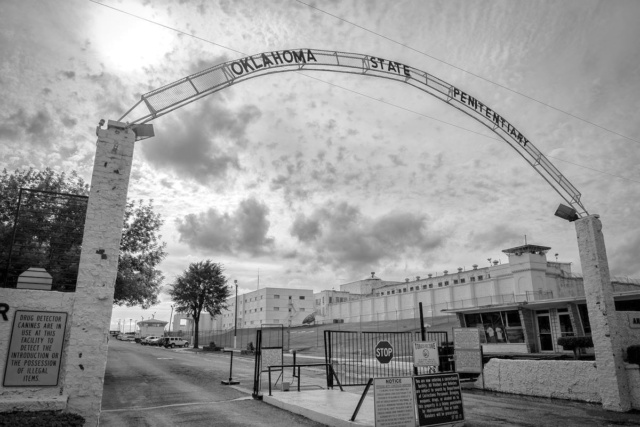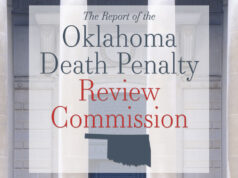

(Editor’s note: This week, NonDoc will publish pieces examining the seven state questions on this November’s Oklahoma ballot. Beginning with this one on SQ 776, the pieces are presented in a “filter” format that attempts to answer key questions about the measures and any campaigns being run for or against them.)
State Question 776 is designed to protect the death penalty in Oklahoma. It will put the death penalty into the State Constitution, and it will say that the death penalty is not cruel and unusual punishment, which therefore does not violate the Eighth Amendment.
SQ 776 will codify the death penalty separately from the state’s method of execution, but the vote is not a referendum on the death penalty itself. Still, any vote on such a controversial topic may functionally be a referendum in terms of voter choice.
August polling data show about three quarters of Oklahoma voters support the death penalty, though more than 50 percent indicated support for replacing death sentences with life without parole and mandatory restitution, according to NewsOK.
Execution methods prescribed in current law
Current Oklahoma law lists lethal injection as the primary method of execution, followed by nitrogen gas if the drugs for lethal injection are not available or it is ruled unconstitutional, a clause added in 2015. Electrocution can be used if the previous two methods are not allowed, and firing squad if the previous three methods are not allowed.
Oklahoma is one of only a few states to provide more than one method for execution. SQ 776 would take this even further, allowing any method to be used that is not prohibited by the U.S. constitution. Additionally, the measure would provide a change so methods of execution could be chosen by the Legislature instead of the judicial or executive branches.
Arguments for and against SQ 776
Proponents for SQ 776 argue that Oklahomans support the death penalty and that it should be used to provide justice to victims of the most heinous crimes. The measure is on the ballot via Senate Joint Resolution 31, which was coauthored by Sen. Anthony Sykes (R-Moore) and Rep. Mike Christian (R-OKC), who is running for Oklahoma County Sheriff. SJR 31 passed the Oklahoma Senate 44-0 and the Oklahoma House 80-10.
Sykes explained his measure during the legislative session:
I feel this is a necessary amendment to our Constitution to number one, establish that the death penalty is not cruel and unusual punishment, to number two, to make it clear that the legislature has the authority to alter those death penalty statutes, and to also ensure that, if a method of execution is declared unconstitutional, then the sentence can still be carried out by another method.
Those against the bill are largely anti-death-penalty advocates who argue it provides for state-sponsored murder. They say the bill would circumvent traditional system of checks and balances while also being more costly for taxpayers.
Arnold Hamilton, editor of the Oklahoma Observer, is against SQ 776. He elucidated his opposition in the Journal Record on Oct. 6:
State Question 776 gives voters the opportunity to cement in the state constitution state-sanctioned killing — a collective embrace of whatever method of execution a court deems appropriate at the time.
Moreover, it would shackle judges by ensuring that death sentences cannot be reduced, should the execution method du jour be found unconstitutional.
It’s a knee-jerk response to the state’s abysmal record of carrying out death sentences in recent years — a series of botched lethal injections that deployed the wrong drugs and left at least one inmate writhing on the gurney.
The pro-capital punishment crowd undoubtedly views this is as a pre-emptive strike to slow, if not stop, the momentum to outlaw the practice.
It’s too late. According to polls, Americans are coming to grips with the fact the death penalty is unfairly applied – minorities and poor disproportionately face the needle.
Oklahoma execution problems
For a reminder of why this issue came to be on the ballot, Oklahoma uses a three-drug protocol in lethal injection executions, with one drug to sedate, one to stop the breathing, and another to stop the heart. Drugs to carry out lethal injection are becoming scarce, as some pharmaceutical companies that make them do not want to support the death penalty and are no longer willing to sell the drugs for executions. Therefore, states have had to switch to other drugs, most notably from sodium thiopental to midazolam, which is often used as a sleeping pill and may not have the same anesthetic effect as the previous drug. That drug’s effects were on display in the horrific execution of Clayton Lockett.
In a separate execution that received national criticism, Oklahoma officials ordered and administered the wrong drug — potassium acetate instead of potassium chloride — to stop the heart of Charles Warner, which likely led to a painful death.
Oklahoma Attorney General Scott Pruitt announced a stay to executions in fall 2015 for an indefinite period of time.
SQ 776 needs 50 percent plus one vote to pass on Nov. 8.




















